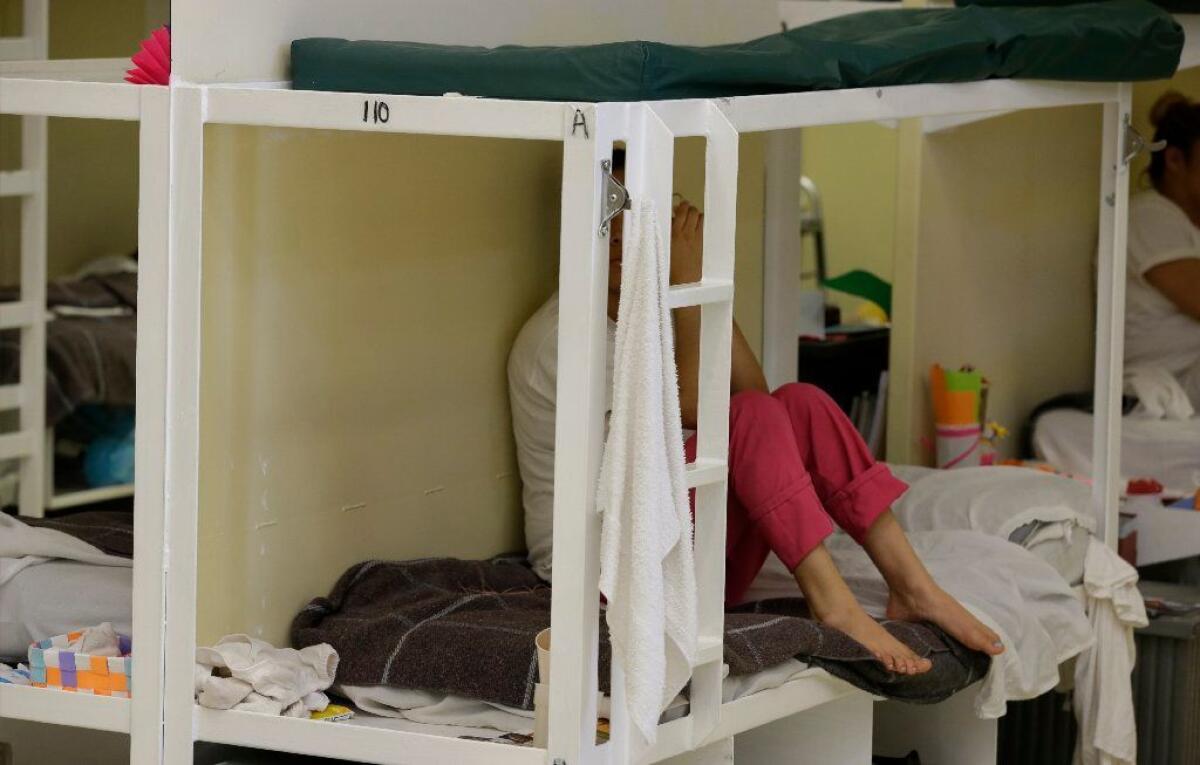Border funding fight bogs down over detention beds. Here’s why

Reporting from Washington — Barely three weeks after parts of the federal government were shut for 35 days in a battle over border security spending, another partial shutdown is possible on Friday.
With negotiations at an impasse, the latest dispute is over beds for detained migrants.
Democrats say limiting the number of detention beds will force the Trump administration to stay within its budget and to stop detaining and deporting undocumented migrants who have broken no other laws.
Administration officials argue Democrats want to release violent criminals into the United States.
“The Democrats do not want us to detain, or send back, criminal aliens!” Trump tweeted Monday. “This is a brand new demand. Crazy!”
Late Monday night, Sen. Richard C. Shelby (R-Ala.), chairman of the Senate Appropriations Committee, said Senate and House negotiators had reached an agreement “in principle” but offered no other details.
Here’s what you need to know.
What are detention beds?
When undocumented migrants are arrested, whether far inland or just inside the border, the space the government has to hold them is generally defined by the number of authorized detention beds.
The current quota, set by Congress, is 40,520 beds. But under President Trump, Immigration and Customs Enforcement, known as ICE, has exceeded that number.
ICE is holding more than 48,000 people, with about 22,000 detained in the interior, Matt Albence, deputy director of ICE, said Monday.
Democratic lawmakers “are trying to undermine our ability to do interior enforcement and enforce immigration law,” Albence said. He added, “Congress has every right to change the law if they don’t like the ones they passed.”
What do Democrats want?
Democrats have proposed reducing the total number of beds to 35,520, according to Rep. Lucille Roybal-Allard (D-Downey), one of the Democratic negotiators.
Democrats want to designate 16,500 of those beds for migrants picked up inside the U.S., she said, a cap derived from enforcement levels in the final years of the Obama administration.
Democrats argue this will force the Trump administration to detain and arrest only migrants with violent or other serious criminal records, rather than longtime residents who may have committed misdemeanors or overstayed visas.
What do Republicans want?
Albence, the ICE deputy director, said the administration wants a total of 52,000 detention beds, reiterating the White House request to Congress for $4.2 billion to support that total.
“That’s really what we need to get the job done,” Albence said.
Republicans say there should be no set limit on the number of immigrants ICE can hold, arguing that it would force the administration to release violent criminals.
“The consequence of such an arbitrary limit is obvious,” Senate Majority Leader Mitch McConnell (R-Ky.) said Monday, “Thousands of criminal aliens would simply be released.”
Are those in ICE custody mostly murderers and violent criminals?
No. According to ICE data for 2018, detained immigrants had 54,630 criminal convictions, including 1,641 convicted for homicides.
The majority of convictions were for driving under the influence, drug abuse, traffic violations and immigration offenses, such as illegal reentry.
Multiple studies, including from the Cato Institute, a libertarian think tank, have concluded that immigration does not lead to increased crime. Statistics show undocumented migrants are less likely to commit crime than U.S. citizens, and legal immigrants even less likely to do so.
States with large immigrant populations tend to have lower crime rates, and major American cities along the border, including El Paso, are some of the safest in the country, according to FBI data.
Will Congress and the White House avoid another shutdown on Friday
Top lawmakers on a conference committee with key appropriators from the Senate and House, including Roybal-Allard, met Monday. They hope to settle on a spending deal, get the House and Senate to pass it, and convince the president to sign it, before the midnight deadline.
Lawmakers may seek only to fund the affected departments through September, but they have begun discussing even shorter-term measures.
Asked if the detention bed issue is worth shutting down the government again, Roybal-Allard said, “No, we are doing everything in our power not to have another shutdown.”
She emphasized that the Democrats’ proposed bill would give the Homeland Security secretary flexibility to ask Congress for more money for beds if they are needed.
What’s the fight really about?
There is a fundamental disagreement between Trump and his opponents over how finite resources for immigration enforcement should be used.
Trump came to office promising to build a border wall and crack down on illegal immigration even though apprehensions at the border, the most commonly used measure for illegal immigration, are at historic lows.
Administration officials say a border security system designed to capture and hold adult males has been overwhelmed in recent years by mostly Central American families and unaccompanied minors seeking asylum in the United States.
Trump’s demand for $5.7 billion for his border wall caused the first shutdown. When he reopened the government on Jan. 25 without getting the money, Democrats felt empowered to use the renewed negotiations to limit immigration policies they oppose.
Roybal-Allard blamed the president’s latest comments for worsening the detention-bed standoff.
“I think it’s really regrettable that the president is once again poisoning the well with misinformation and mischaracterization,” she said. “We were moving along at a good pace until he started to interject.”
Twitter: @mollymotoole
More to Read
Get the L.A. Times Politics newsletter
Deeply reported insights into legislation, politics and policy from Sacramento, Washington and beyond. In your inbox three times per week.
You may occasionally receive promotional content from the Los Angeles Times.











